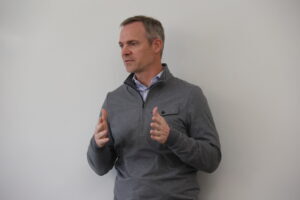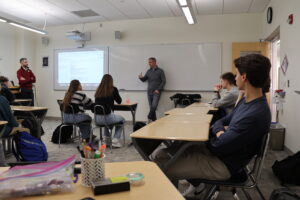November 19, 2024
Finance Class Learns the Ropes from a Pro
Board member, KO graduate, and partner in Algebris, a global asset manager firm, Mark Conrad, spoke to an Introduction to Finance class last week. In the high-stakes world of finance, few paths are as unpredictable as Conrad’s. He started my career in a seemingly stable environment, only to pivot dramatically to a new opportunity that, at the time, felt like a massive risk. Every step along the way has shaped the person he is today.
While at Williams College as a poly science major, Conrad set his sights on becoming a foreign service officer, interning at the State Department and the Senate. His friends’ experience sin the booming stock market of the late 1990s piqued his interest, and he took a winter-term stock market class, which shifted his career path. “The best thing about internships is you figure out what you want to do or what you don’t want to do,” he said. “I realized that going through the whole process, like at the State Department, is great, but it’s not really what I want to do for my career.”
He started his career at Wellington Management in Boston, a globally respected firm with a growing reputation in asset management. It currently manages a trillion and a half dollars. The company was large, established, and had a reputation for excellence, managing billions in assets. It seemed like a dream job—a safe, long-term position in a well-established company. He was doing well, moving up the ranks, and envisioning a lifelong career at Wellington.
However, six years into his role, his career trajectory took an unexpected turn. His boss left Wellington to start his own hedge fund in London and asked Conrad to come with him. At 28, he was newly engaged and had no children, making it an ideal time to take a leap of faith. Despite his deep fondness for Wellington and his desire to stay there, the opportunity to build something from the ground up felt like a once-in-a-lifetime chance.
Leaving Wellington was not an easy decision. He told his boss’s boss, a mentor of his, that he was leaving to join a startup hedge fund. His response was blunt and unforgettable: “This is the biggest mistake of your life. You know you’re going to be out of a job in a year.” It was 2006, and while the economy was booming, the world of finance was about to face the most significant upheaval it had seen in decades.
He made the jump with his boss and three other partners and founded a hedge fund that focused on investing in financial companies—banks, insurance firms, asset managers, and real estate companies. It was a bold move, but nothing could have prepared us for what happened next.
The group had only been operating for a year when the 2008 financial crisis hit. In retrospect, starting a hedge fund that focused exclusively on financial companies was like stepping directly into the storm’s eye. As Lehman Brothers collapsed and global markets tanked, his firm faced challenges no one could have predicted.
The crisis tested their resolve, but it also strengthened their focus. Despite the chaos, they managed to weather the storm, build a solid track record, and come out stronger on the other side. His firm’s assets grew from $600 million at the outset to about $30 billion today, and the team expanded from five people to nearly 190. But that early period—2008, in particular—was a rollercoaster.
It wasn’t just the market turmoil they had to contend with. In 2008, they realized they needed expertise in the bond market, an area they were less familiar with. He called up an old colleague from Wellington, Kingswood Oxford ’96 classmate, James Friedman,
and he agreed to join their team. Today, he manages two of their biggest funds, and his partnership has been a key factor in the firm’s success.
At Wellington, the job was relatively structured, more or less a nine-to-five job. But at the hedge fund, the hours were relentless. He worked from 9:00 AM until well past 10:00 PM, managing the US market from London’s time zone. His work-life balance was out of whack, but the adrenaline and the thrill of building something new kept him going.
The leap from Wellington to a small startup hedge fund was a significant cultural shift. Wellington was a massive organization—at the time, it had about 350 employees. Conrad said he was a small cog in a very large wheel. His role as a junior research assistant within a department of many was stable and predictable, and there was a clear path to advancement.
In contrast, the hedge fund he joined was a startup. The environment was vastly different – small, scrappy, and faced a steep uphill battle. He transitioned from being a research assistant to a more active partner in the business, taking on far more responsibility.
The decision to take that risk, despite the uncertainty, shaped the trajectory of his career. He said he learned that being prepared to take risks, whether in business, education, or life, can lead to immense rewards. He said he wouldn’t have been able to take the risk of leaving Wellington and joining the hedge fund if he hadn’t worked hard to build his skill set and knowledge base.
Success in finance is competitive, and without the drive and preparation, it’s easy to get left behind. “For each intern we hire, I see 100 resumes, and they are all really, really good. So you need that passion, interest, and drive to succeed.”
Today, Conrad oversees a global team. His office is based in Connecticut, with teams in London and Milan. The financial markets continue to evolve, and his firm has adapted along the way. They are still focused on the financial sector—banks, insurance companies, and asset management firms. They take a value-driven approach to investing, looking for companies with strong earnings potential and stable cash flows. Their job is to find companies that can weather market storms and deliver long-term value, which requires both a keen understanding of global macroeconomic trends and a rigorous, data-driven approach to stock picking.
One student asked about the company investing in Bitcoin, and Conrad was skeptical. “That’s fine for someone else…But to us, we need a significant cushion of value that we fall back on,” he said. “ We look for an asymmetrical risk-reward, which is upside versus downside. You can only get that if you have real cash flow generation behind the company.”
From his early days at Wellington to co-founding a hedge fund and managing it through one of the most tumultuous times in financial history, Conrad’s career has been defined by risk, reinvention, and constant learning. He suggested that the students follow the markets and read the papers daily so they understand what’s driving the markets. He doesn’t rule out students taking liberal arts in college but to maintain a balance with business classes to make themselves more marketable in the finance world.
News Main News
